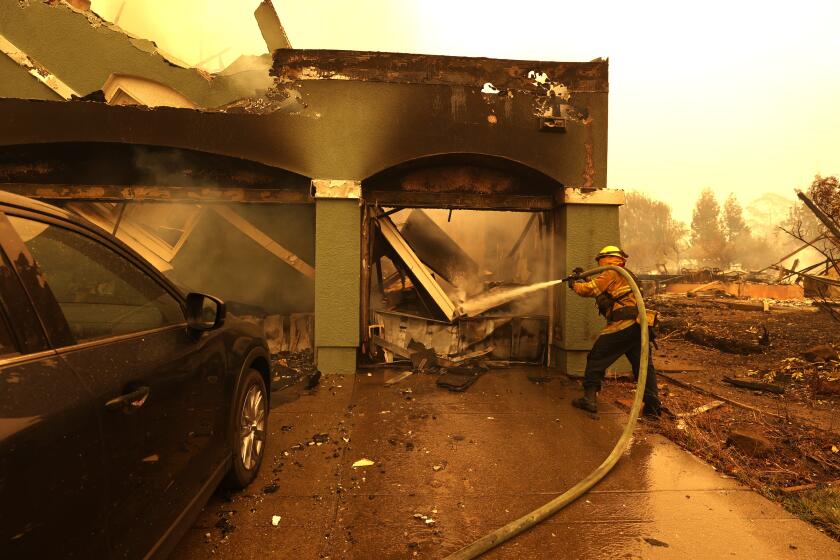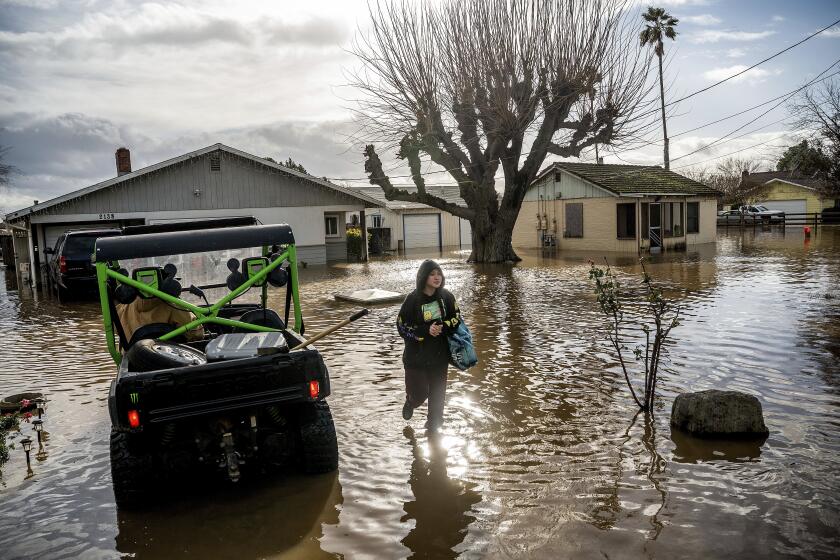Farmers, California’s second-largest insurer, limits new home insurance policies

- Share via
When State Farm, California’s top home insurer, said it would no longer write new policies in the state in late May, homeowners began flocking to Farmers Insurance, the second-largest company in the field.
Now Farmers Insurance is signaling that it has no plans to fill the gap in the market. After seeing a surge in demand last month, Farmers said it has capped the number of new policies it will write in the state each month.
The Los Angeles-based insurer said that it was limiting new policies in California “to a level consistent with the volume we projected to write each month before recent market changes,” effective July 3, and is continuing to renew its existing policies.
In other words, Farmers is pursuing business as usual — but in an insurance market that has gotten more than a little unusual in the last few months.
State Farm announced at the end of May that it was hitting pause on writing new homeowners policies in the state, while also committing to renewing its existing policies. Allstate, sixth in the rankings, hit pause late last year.
California’s biggest seller of homeowners insurance says regulations and wildfires make new policies a financial loser. But there are reasons to question that explanation.
Business as usual for Farmers means adding about 7,000 new homeowners policies a month, said California Department of Insurance spokesperson Michael Soller. “We do not expect their footprint in the state to change significantly one way or another,” he said in a statement.
In 2022, Farmers policies made up a little under 15% of the $12-billion California market for homeowners insurance. State Farm, which had been on a five-year sprint to expand its market share in California before hitting pause, has more than 21% of the market.
Farmers said that “record-breaking inflation, severe weather events and reconstruction costs continuing to climb” were behind its decision, in a statement from spokesperson Luis Sahagun.
Rising construction and labor costs mean that repairing or rebuilding homes has become more expensive for insurers, and California’s recent periods of flood and fire have led to some years of major losses for home insurers.
Farmers’ decision not to pick up the slack left by State Farm and Allstate is also driven by a basic insurance concept: Don’t insure every house on the block. Companies like to spread their risk across as wide an area as possible, so that if disaster strikes in one place, they aren’t left on the hook for too much of the damage on their own.
The insurance companies refusing to write new policies for California homeowners is a wake-up call. Climate change must be part of the conversation about how and where we build.
Although Farmers mentioned only inflation and severe weather, State Farm was more explicit when it announced its move, adding fire risk and the volatile reinsurance market — which has driven up costs for insurers to insure themselves in case of disasters — to its list of reasons to stop growing in the California market.
Insurance industry advocates have said that California’s insurance department, headed by Insurance Commissioner Ricardo Lara, has been too slow to approve necessary rate increases to keep pace with inflation and growing risk. The industry would also like to pass along reinsurance costs and use forward-looking fire risk models to set premium prices.
The insurance department, in turn, has encouraged companies to ask for all the rate increases they need at once, rather than parceling out requests over time. The department is also hosting a workshop later this week to discuss the forward-looking wildfire models that insurance companies would like to use when setting rates.
More to Read
Inside the business of entertainment
The Wide Shot brings you news, analysis and insights on everything from streaming wars to production — and what it all means for the future.
You may occasionally receive promotional content from the Los Angeles Times.













